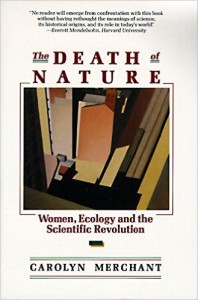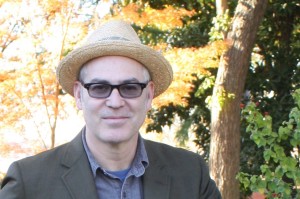Carolyn Merchant, The Death of Nature: Women, Ecology, and the Scientific Revolution (San Francisco: Harper & Row, 1980)
Classics Review by Anthony Chaney
Earlier this year, the state of Texas passed a bill banning municipalities from limiting the practice of hydraulic fracturing (fracking) locally. In 2014, the city of Denton voted to prohibit fracking within its borders, and this new bill was the response of state legislators. One oil industry representative explained his support for the bill by saying that some people just wanted to stop drilling for oil and gas altogether. “To these folks I say, ‘Ride your horse to work every day’,” he added.
One might go on for a long time unpacking the remark. I heard it in connection to my re-reading of The Death of Nature, Carolyn Merchant’s 1980 classic of social-environmental-intellectual history.
Along with other early classics by David Worster and William Cronin, Merchant’s book represented a decade of historical scholarship following the widespread emergence of modern environmentalism during the last few years of the 1960s. The work done by these historians added complexity and sophistication to initial conversations on the topic, such as Lynn White, Jr.’s seminal essay, “The Historical Roots of our Environmental Crisis,” published in Science in 1967. To identify the root of the problem, White initially seized on the Scientific Revolution, the “marriage between science and technology” that marked the shift from the medieval to the modern. But he quickly leapt back another half a millennium, to Christianity’s snuffing out of the old pagan animism. By pinning the blame on the Judeo-Christian element in the Western mind, White could then identify a solution to present troubles in the equivalent of “a new religion.” Merchant, in contrast, burrowed into the sixteenth and seventeenth centuries and put hundreds of pages of scholarly flesh on the bones that White had skimmed over.
Her work culminates, just past the halfway point, in five industrial-strength paragraphs. To remedy the anxious breakdown of all the old hierarchical and geocentric orders, new forms of order and power were provided, she explains. The new order was based on a “determined system” of natural laws. Power was redefined as
active and immediate intervention in a secularized world. Order and power together constituted control. Rational control over nature, society, and the self was achieved by redefining reality itself through the new machine metaphor.
By depicting nature as “a system of dead, inert particles,” the machine metaphor permitted a new kind of leveraging of the natural world: large-scale, profit-driven, and based on values all “fully compatible with the directions taken by commercial capitalism” (193).
This is where I thought of the remarks of the Texas senator. It may be that the oil and gas industry and their representatives grasp the environmentalist critique more clearly than do many mainstream sympathizers. Here and elsewhere, Merchant’s analysis lays the loss  of the moral constraints that once protected nature at the doorstep of “the emerging market economy.” Capitalism and the “mechanistic utopia” underwrote new forms of hierarchy that “tended to widen the gap between upper and lower social classes” (80, 185). What was needed wasn’t necessarily a new religion, but a new economic system to combat the present crisis, or so implied The Death of Nature in the year Ronald Reagan was elected president.
of the moral constraints that once protected nature at the doorstep of “the emerging market economy.” Capitalism and the “mechanistic utopia” underwrote new forms of hierarchy that “tended to widen the gap between upper and lower social classes” (80, 185). What was needed wasn’t necessarily a new religion, but a new economic system to combat the present crisis, or so implied The Death of Nature in the year Ronald Reagan was elected president.
The Death of Nature is also significant for the case it made for an environmental history. Too heavy a reliance on economic or political modes of historical explanation was “inadequate,” Merchant argued. She offered instead an “ecosystem model,” a history “from the ground up” (42). This explains the “ecology” in her subtitle, and it partially explains the “women” in the subtitle, too. Before the triumph of mechanism, an association between nature and women had included both positive and negative components. For the triumph to occur, the positives had to be eliminated. The negatives were then constituted as persons and targeted. Eliminating the perception of a living, nurturing earth meant eliminating those women who were perceived to have access to earth’s reproductive bounty. Midwives and other practitioners of folk medicine were identified as witches and burned.
Merchant’s inclusion of this rich, gender-related material was informed by a decade of identity politics, the rise of a bolder and more separatist feminism, and the disciplinary standing of social history after the crises of the Sixties and Seventies. When Merchant spoke of “history from the ground up,” she was of course alluding to the “bottom up” perspective of social history, which then held the moral high ground within the field.
What may not have been as clear at the time of publication was how The Death of Nature was one of several variations on a broader post-Sixties theme. It was a theme in which communal-Gaia-woman was set off against rational-Promethean-man, within a consciousness of environmental deterioration. Richard Tarnas’s survey, The Passion of the Western Mind (1991), ends on something of that note. Beginning in the late 1980s, SUNY Press devoted a whole series to Constructive Modern Thought, under the editorship of David Ray Griffin, and many of the writers in that series play a similar tune. Looking back, it appears that The Death of Nature was one of the works that initiated a period when eco-feminist theory offered the best hope for a humane and fruitful postmodernism.
That hope has not completely evaporated. Who can argue that the earth’s atmosphere would not now be so pumped full of carbon particles had the earth continued to be honored as a living Mother, rather than being penetrated and probed? The extractive industries and their financiers have been the big winners of modernization, the biggest shapers of the way we now live. To see the world as alive again would likely mean also to re-gender it, to restore its “female soul.” Calling for this sort of restoration, however, would be to traffic in a feminine essentialism which Merchant soundly rejects. “I am not asking about unchanging essences,” she assures in her 1990 preface. Her concern is with “social change” and “changing constructions of nature” (xvi). The point is under-argued, but her insistence remains with the premise that the human perception of reality is a construct, socio-economically situated. That stance must dismiss any creeping essentialism.
Now I come to matters in The Death of Nature that remain most live to me. Reality is a human construct, and as such, it can be re-constructed. That’s the basic premise, is it not? If accepted, it can undermine prevailing constructions, ones that make the natural world, women, people of color, and the poor objects of exploitation. If accepted, it can make way for new constructions that support the sustainability and egalitarianism that we prize. We can stop employing the machine metaphor and construct a new one. We have that in our power. This way of thinking challenges the mechanistic philosophy’s new form of order, as Merchant explained it. It does not challenge, however, the mechanistic philosophy’s new form of power. The idea that power is “derived from active and immediate intervention in a secularized world” is not undermined, but rather, reinforced.
If this seems like a dead-end path of inquiry, that’s because any other conception of human power is unimaginable. “As the unifying model for science and society,” Merchant writes, “the machine has permeated and reconstituted human consciousness so totally that today we scarcely question its validity.” It is “our everyday, common sense reality” (193). That was thirty-five years ago. Since then, the amount of heat-trapping carbon in the atmosphere has doubled.
This makes me wonder whether Merchant’s socially-sensitive mode of historical analysis was radical enough. Can we really look at history with from an “earth’s eye view” (42), in the same way we can look from the perspective of women, laboring people, and people of color? Can we grant nature “rights,” in the same way we grant rights to other human beings? Nature may not be an “it,” but it isn’t quite a “thou,” either. To think that way is intuitive, and it speaks clearly to our desire for alternative forms of order. To alternative forms of power it speaks less clearly. The emphasis remains on differentiation, on bodies of interest in “masculine” competition, rather than on undifferentiated (allegedly) feminine unity. For the contemporary mind, the modern creed of human power remains the “active and immediate intervention in a secularized world.” Might such power be surrendered? The notion is barely tolerable. The human “fix,” technological or otherwise, is still the final bulwark against giving up in despair and doing nothing.
Anthony Chaney (PhD, University of Texas at Dallas) is working on a book about Gregory Bateson, his double bind concept, and its connection to ecological thought. He previously wrote a post for us here.


2 Thoughts on this Post
S-USIH Comment Policy
We ask that those who participate in the discussions generated in the Comments section do so with the same decorum as they would in any other academic setting or context. Since the USIH bloggers write under our real names, we would prefer that our commenters also identify themselves by their real name. As our primary goal is to stimulate and engage in fruitful and productive discussion, ad hominem attacks (personal or professional), unnecessary insults, and/or mean-spiritedness have no place in the USIH Blog’s Comments section. Therefore, we reserve the right to remove any comments that contain any of the above and/or are not intended to further the discussion of the topic of the post. We welcome suggestions for corrections to any of our posts. As the official blog of the Society of US Intellectual History, we hope to foster a diverse community of scholars and readers who engage with one another in discussions of US intellectual history, broadly understood.
I have great respect for people who live in Texas and can still keep their sanity. There are good people there. But they are so embattled.
FWIW, I can testify that my friend and colleague Anthony Chaney is a good person — and no doubt would be a good person whether he lived in Texas or not.
But of course Texas is not a cultural, intellectual or political monolith (any more than California is). The Lone Star State has its graces and charms. Now, for this Californian anyhow, Texas has taken some getting used to — and I was born and raised in the San Joaquin Valley, and hail from a family of Dust Bowl refugees! So it wasn’t as large a leap for me to navigate the state’s oddments and eccentricities as it might have been for some who relocated here from more coastally cosmopolitan and/or politically Left-ish locales. Happily, the more people relocate here from elsewhere, the more culturally and intellectually and politically vibrant and diverse Texas gets. It will never quite be home for me, but most of the time it’s a nice place to be.
And don’t forget — the 2017 S-USIH conference is happening in Dallas! So, y’all come. We are going to have a fine time together, I know. And if anybody wants get crazy, I’m sure Texas will oblige.